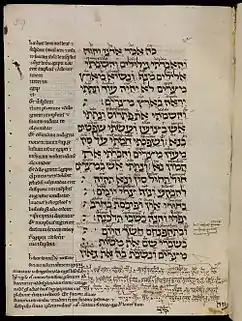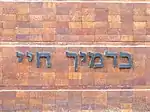Ezekiel 16
Ezekiel 16 is the sixteenth chapter of the Book of Ezekiel in the Hebrew Bible or the Old Testament of the Christian Bible. This book contains prophecies attributed to the prophet/priest Ezekiel, and is one of the Books of the Prophets. Biblical scholar R. E. Clements calls this chapter "an Old Testament parable of the prodigal daughter", describing a shocking illustration of ungrateful Jerusalem in contrast to God's enduring love to her.[1] This chapter is often linked to Ezekiel 23, which deals with two daughters, symbolizing the Kingdoms of Israel and Judah.[2]
| Ezekiel 16 | |
|---|---|
 Book of Ezekiel 30:13–18 in an English manuscript from the early 13th century, MS. Bodl. Or. 62, fol. 59a. A Latin translation appears in the margins with further interlineations above the Hebrew. | |
| Book | Book of Ezekiel |
| Hebrew Bible part | Nevi'im |
| Order in the Hebrew part | 7 |
| Category | Latter Prophets |
| Christian Bible part | Old Testament |
| Order in the Christian part | 26 |
Text
The original text was written in the Hebrew language. This chapter is divided into 63 verses.
Textual witnesses
Some early manuscripts containing the text of this chapter in Hebrew are of the Masoretic Text tradition, which includes the Codex Cairensis (895), the Petersburg Codex of the Prophets (916), Aleppo Codex (10th century), and Codex Leningradensis (1008).[3] Fragments containing parts of this chapter in Hebrew were found among the Dead Sea Scrolls, that is, 3Q1 (3QEzek; 50 BCE–50 CE) with extant verses 31–33.[4][5][6][7]
There is also a translation into Koine Greek known as the Septuagint, made in the last few centuries BC. Extant ancient manuscripts of the Septuagint version include Codex Vaticanus (B; B; 4th century), Codex Alexandrinus (A; A; 5th century) and Codex Marchalianus (Q; Q; 6th century).[8][lower-alpha 1]
Verse 2
- Son of man, cause Jerusalem to know her abominations,[10]
- "Son of man" (Hebrew: בן־אדם ḇen-'ā-ḏām): this phrase is used 93 times to address Ezekiel.[11]
- "Abomination" (Hebrew: תּוֹעֵבָה tôwʻêbah, to-ay-baw'): something loathsome or objectionable, especially for "Jehovah" (Proverbs 3:32; 21:27), "specially used for things belonging to the worship of idols" or idolatrous practices and objects.[12][13]
Verse 3
- And say, Thus saith the Lord God unto Jerusalem;
- Thy birth and thy nativity is of the land of Canaan;
- thy father was an Amorite, and thy mother an Hittite.[14]
God "commands Ezekiel to inform Jerusalem of the accusation brought against her, and in verses 3—34 provides a 'biography' for his bride".[15] The assimilation of Israel with those former residents [of the land of Israel] led to apostasy.[16]
Verse 6

- And when I passed by thee, and saw thee polluted in thine own blood,
- I said unto thee when thou wast in thy blood,
- Live; yea, I said unto thee when thou wast in thy blood, Live.[17]
Verse 16
- Moreover you multiplied your acts of harlotry as far as the land of the trader, Chaldea; and even then you were not satisfied.[21]
Chaldea: "the land of the trader" or "the land of merchants".[22] The King James Version lacks the wording which describes Chaldea as a trading nation.[17]
Verses 59-63
God promises at last to forgive Jerusalem.[15]
Verse 60
- Nevertheless I will remember my covenant with thee in the days of thy youth,
- and I will establish unto thee an everlasting covenant.[23]
God's remembrance of God's covenant with the patriarchs of Israel was anticipated in Leviticus 26:43–45.[16]
See also
- Amorites
- Assyria
- Canaan
- Chaldea
- Egypt
- Hittites
- Jerusalem
- Philistine
- Rape in the Hebrew Bible § Ezekiel 16 and 23
- Samaria
- Sodom
- Related Bible parts: Genesis 14, Leviticus 26, Isaiah 47, Ezekiel 23, John 15, Revelation 17
Notes
- Ezekiel is missing from the extant Codex Sinaiticus.[9]
References
- Clements 1996, p. 67-73.
- Clements 1996, p. 70.
- Würthwein 1995, pp. 35–37.
- Ulrich 2010, p. 588.
- Dead sea scrolls - Ezekiel
- Fitzmyer, Joseph A. (2008). A Guide to the Dead Sea Scrolls and Related Literature. Grand Rapids, MI: William B. Eerdmans Publishing Company. p. 27. ISBN 9780802862419. Retrieved February 15, 2019.
- 3Q1 at Leon Levy Collection
- Würthwein 1995, pp. 73–74.
- Shepherd, Michael (2018). A Commentary on the Book of the Twelve: The Minor Prophets. Kregel Exegetical Library. Kregel Academic. p. 13. ISBN 978-0825444593.
- Ezekiel 16:2: King James Version (KJV)
- Bromiley 1995, p. 574.
- Brown, Briggs & Driver 1994 "תּוֹעֵבָה"
- Gesenius 1979 "תּוֹעֵבָה"
- Ezekiel 16:3: KJV
- Galambush, Julie (2007), Ezekiel in Barton, J. and Muddiman, J. (2001), The Oxford Bible Commentary Archived 2017-11-22 at the Wayback Machine, p. 545
- The New Oxford Annotated Bible with the Apocrypha, Augmented Third Edition, New Revised Standard Version, Indexed. Michael D. Coogan, Marc Brettler, Carol A. Newsom, Editors. Publisher: Oxford University Press, USA; 2007. p. 1198-1201 Hebrew Bible. ISBN 978-0195288810
- Ezekiel 16:6: KJV
- Brown, Francis; Briggs, Charles A.; Driver, S. R. The Brown-Driver-Briggs Hebrew and English Lexicon. Hendrickson Publishers; Reprint edition (1994). ISBN 978-1565632066. "בּוּס".
- Gesenius, H. W. F. Gesenius' Hebrew and Chaldee Lexicon to the Old Testament Scriptures: Numerically Coded to Strong's Exhaustive Concordance, with an English Index. Samuel Prideaux Tregelles (Translator). Baker Book House; 7th edition. 1979. בּוּס
- Rashi's Commentary on Ezekiel, 16:6.
- Ezekiel 16:6: NKJV
- Ezekiel 16:6: New Revised Standard Version
- Ezekiel 16:60
Bibliography
- Bromiley, Geoffrey W. (1995). International Standard Bible Encyclopedia: vol. iv, Q-Z. Eerdmans. ISBN 9780802837844.
- Brown, Francis; Briggs, Charles A.; Driver, S. R. (1994). The Brown-Driver-Briggs Hebrew and English Lexicon (reprint ed.). Hendrickson Publishers. ISBN 978-1565632066.
- Clements, Ronald E (1996). Ezekiel. Westminster John Knox Press. ISBN 9780664252724.
- Gesenius, H. W. F. (1979). Gesenius' Hebrew and Chaldee Lexicon to the Old Testament Scriptures: Numerically Coded to Strong's Exhaustive Concordance, with an English Index. Translated by Tregelles, Samuel Prideaux (7th ed.). Baker Book House.
- Joyce, Paul M. (2009). Ezekiel: A Commentary. Continuum. ISBN 9780567483614.
- Ulrich, Eugene, ed. (2010). The Biblical Qumran Scrolls: Transcriptions and Textual Variants. Brill.
- Würthwein, Ernst (1995). The Text of the Old Testament. Translated by Rhodes, Erroll F. Grand Rapids, MI: Wm. B. Eerdmans. ISBN 0-8028-0788-7. Retrieved January 26, 2019.